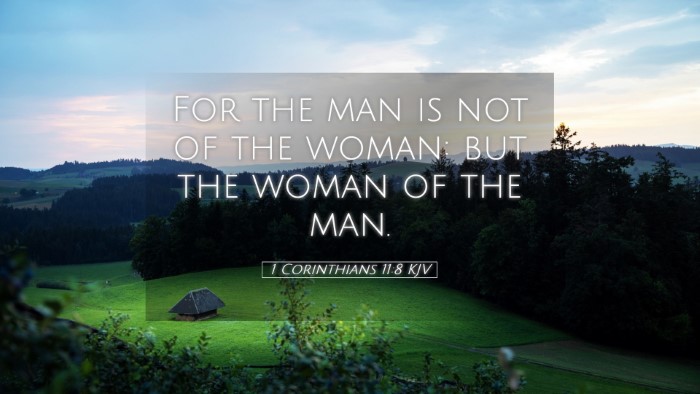Commentary on 1 Corinthians 11:8
Verse Context: 1 Corinthians 11:8 states, "For man is not of the woman; but the woman of the man." This verse emerges within a larger discussion about head coverings and the order of authority in relationships. Understanding the cultural and theological implications of this verse is vital for pastors, theologians, and serious students of scripture.
Introduction
This passage from the Apostle Paul has often been debated and discussed regarding its implications for gender roles and relationships within the church and the family. The insights derived from public domain commentaries by Matthew Henry, Albert Barnes, and Adam Clarke provide clarity and depth to this verse, shedding light on the original intent and application for contemporary audiences.
Matthew Henry's Insights
Divine Order and Creation: Matthew Henry emphasizes the divine order established at creation. He notes that the woman was created from man and for man, highlighting a distinct relational hierarchy. In his view, this hierarchy is not one of superiority but reflects God’s design for harmony and order.
- Creation Account: Henry points to Genesis 2:21-22, where Eve is formed from Adam's side, illustrating the intimate connection and dependence between men and women.
- Mutual Dependence: He contends that this relationship fosters a sense of mutual dependence rather than a simplistic power dynamic, indicating that both play crucial roles in God's creation.
- Spiritual Application: Henry applies this understanding to spiritual matters, suggesting that men and women, while distinct, are both essential to the body of Christ.
Albert Barnes' Commentary
Understanding of Authority: Albert Barnes provides critical commentary on the text's implications regarding authority and roles of men and women. He articulates that this verse is often misunderstood and must be interpreted within its contextual framework.
- Cultural Context: Barnes stresses that the cultural context of Corinth must be considered; the issue of head coverings was not solely about authority but also about propriety in worship.
- Spiritual Equality: He argues that while there is a distinction in roles, there remains a spiritual equality before God, supported by Galatians 3:28, where men and women are equally valued in Christ.
- Authority vs. Superiority: Barnes clarifies that having authority does not equate to being superior; rather, it reflects the structure of governance God has set in place.
Adam Clarke's Analysis
Theological Implications: Adam Clarke's commentary dives deep into the theological implications of Paul’s message in 1 Corinthians 11:8. He acknowledges that this verse led to much discussion among theologians regarding gender roles.
- Historical Background: Clarke provides valuable historical insight into the practices of the early church, explaining how customs surrounding head coverings communicated theological truths in that culture.
- Role of Men and Women: He insists that understanding the role of women in the church and family is imperative, emphasizing that Paul’s intention was to honor God’s order rather than diminish the value of women.
- Application for Today: Clarke encourages modern readers to discern the heart of Paul’s teaching, which is aimed at glorifying God and promoting order and respect in worship settings.
Summary of Theological Perspectives
Across these commentaries, several key themes emerge regarding 1 Corinthians 11:8:
- Creation Order: There is a consistent recognition of the creation order as fundamental to understanding gender roles. This order is part of God's design, aiming for harmony rather than hierarchy.
- Spiritual Equality: Despite the distinct roles presented, emphasis is placed on the spiritual equality of men and women in Christ.
- Cultural Nuances: Each commentator urges a consideration of cultural factors, stressing that interpretation must account for the specific context of Corinthian society.
- Modern Application: The principles can be adapted for contemporary church settings, advocating for respect and recognition of both men’s and women’s contributions in ministry.
Conclusion
The exegesis of 1 Corinthians 11:8 reveals profound truths about gender, authority, and relationships as intended by God. For pastors, theologians, and students of Scripture, the teachings found in this verse and its surrounding context urge a thoughtful and nuanced understanding of how to apply these principles in today’s church and society.


